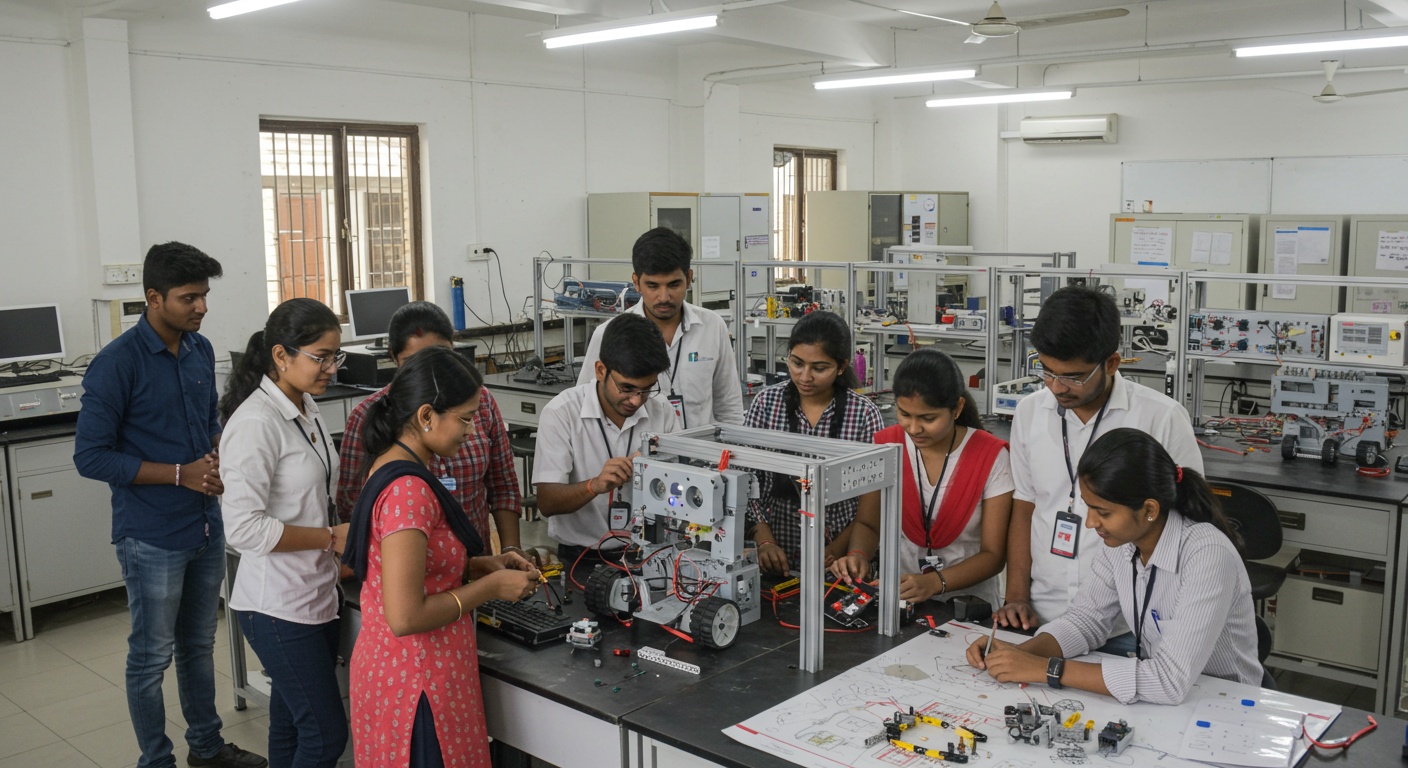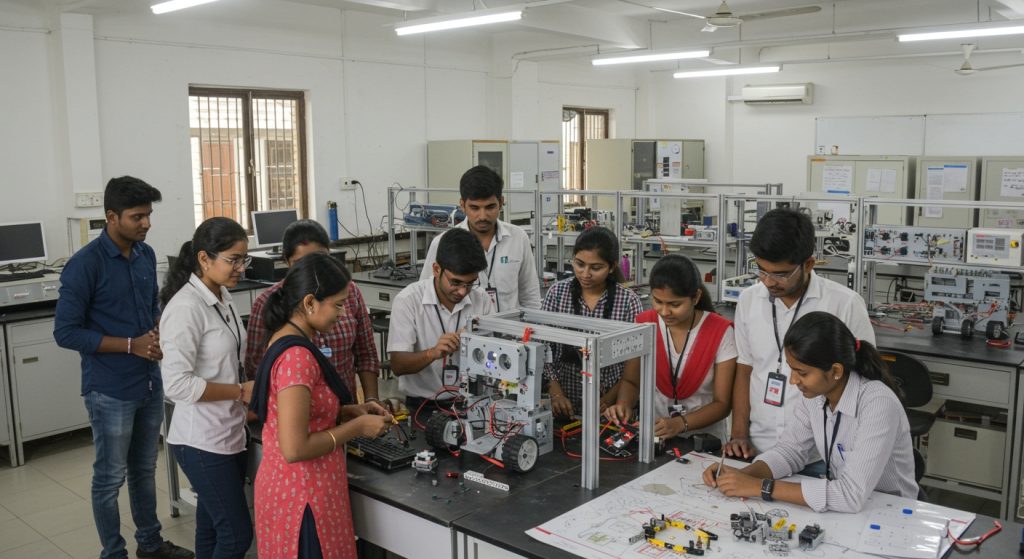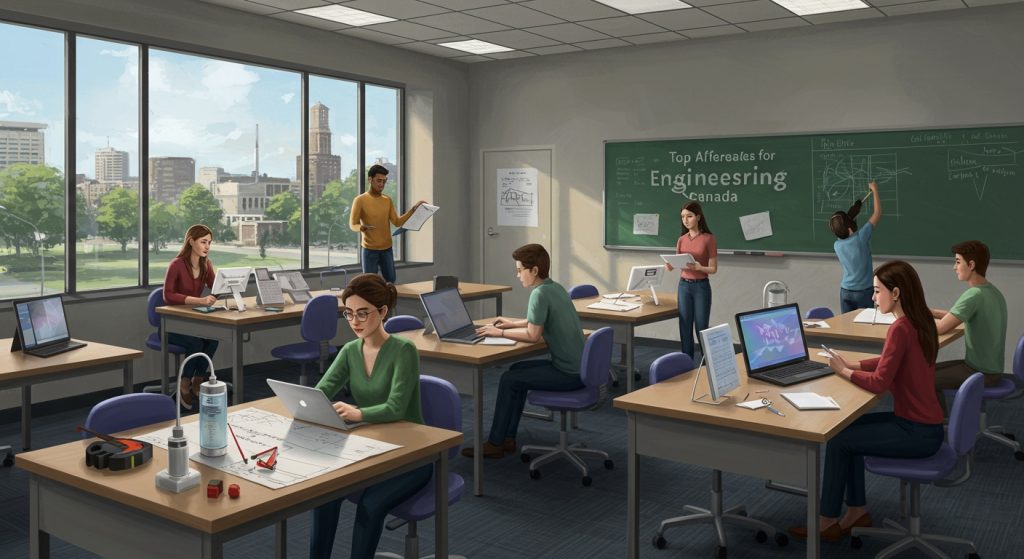The pursuit of an engineering degree in India often feels like navigating a financial maze. Skyrocketing tuition fees at prestigious institutions leave many aspiring engineers burdened with debt. But, a smart approach focuses on institutions delivering exceptional return on investment (ROI). We explore affordable engineering colleges leveraging strategic industry partnerships and updated curricula aligned with current market demands like AI, data science. Sustainable technologies. Discover institutions where a reasonable investment translates into high-paying job opportunities, fostering financial independence and a fulfilling career without the crippling weight of excessive student loans, effectively democratizing access to quality engineering education.

Understanding Return on Investment (ROI) in Engineering Education
Return on Investment (ROI) in the context of Engineering education is a metric that measures the profitability of your investment in a degree. It essentially answers the question: “How much financial benefit will I receive in return for the money and time I spend on my Engineering education?”. A high ROI indicates that the investment in your education is likely to pay off handsomely in the form of higher salaries and better career opportunities. It’s calculated by considering factors like tuition fees, living expenses, potential starting salary after graduation. Long-term career earnings.
For example, consider two scenarios:
- Scenario 1
- Scenario 2
An Engineering degree from a private college with high tuition fees leads to a starting salary of ₹6 LPA (Lakhs Per Annum).
An Engineering degree from a government college with low tuition fees leads to a starting salary of ₹5 LPA.
While the starting salary in Scenario 1 is higher, the lower tuition fees in Scenario 2 might result in a higher overall ROI over the long term. The calculation isn’t always straightforward, involving factors like career growth rate and industry demand.
Factors Influencing the Affordability and ROI of Engineering Colleges
Several factors contribute to the affordability and ROI of Engineering colleges in India. These can be broadly categorized into:
- Tuition Fees
- Living Expenses
- Placement Record
- Infrastructure and Resources
- Scholarship Opportunities
- Location and Industry Connect
This is the most obvious factor. Government colleges generally have significantly lower tuition fees than private colleges.
The cost of living in the city where the college is located can significantly impact the overall cost of education. Tier-II and Tier-III cities often have lower living expenses compared to metropolitan areas.
A college’s placement record is a crucial indicator of ROI. Colleges with strong industry connections and a high percentage of students placed in reputable companies tend to offer better ROI.
While not directly impacting affordability, the quality of infrastructure, laboratories. Faculty can significantly influence the quality of education and, consequently, career prospects.
Many colleges offer scholarships based on merit or financial need, which can significantly reduce the overall cost of education.
Colleges located in industrial hubs often have better industry collaborations and internship opportunities, leading to improved placement prospects.
Top Affordable Engineering Colleges in India with High ROI
Identifying colleges with high ROI involves considering affordability and placement statistics. While rankings change, some consistently perform well in offering quality Engineering education at a reasonable cost. Here are some examples:
- Indian Institutes of Technology (IITs)
- National Institutes of Technology (NITs)
- Government Engineering Colleges (GECs)
- Institute of Chemical Technology (ICT), Mumbai
- Jadavpur University, Kolkata
Though highly competitive, the IITs offer excellent education at subsidized fees. The brand name and placement records ensure a very high ROI.
Similar to IITs, NITs provide quality Engineering education at relatively affordable fees, leading to good placement opportunities.
Many state-run GECs offer quality education at very low tuition fees. While placements might not be as high as IITs or NITs, the low cost makes them attractive in terms of ROI. Examples include College of Engineering, Pune (COEP). Government Engineering College, Thrissur.
Specializing in chemical Engineering and technology, ICT has a strong reputation and good placement record.
Known for its strong Engineering programs and affordable fees, Jadavpur University consistently ranks high in national rankings.
This list is not exhaustive and is based on general observations. Prospective students should conduct thorough research and consider their individual circumstances before making a decision.
Analyzing Placement Data and Industry Connections
A key factor in determining ROI is analyzing placement data. Look beyond the average salary and consider the following:
- Placement Percentage
- Companies Visiting the Campus
- Salary Packages Offered
- Internship Opportunities
What percentage of students get placed each year? A high placement percentage indicates strong industry connections.
Which companies recruit from the college? Are they reputable companies in your field of interest?
What is the range of salary packages offered? A wide range indicates diverse opportunities.
Does the college offer internship opportunities in relevant industries? Internships provide valuable experience and can lead to full-time job offers.
Colleges often publish placement reports on their websites. You can also connect with alumni on platforms like LinkedIn to get firsthand data about placement experiences.
For instance, if a college consistently attracts companies like TCS, Infosys. Wipro for mass recruitment and also has a few niche companies like Intel or Qualcomm visiting for specialized roles, it signifies a healthy industry connect.
Scholarship and Financial Aid Options
Numerous scholarship and financial aid options are available to help students finance their Engineering education. These include:
- Merit-Based Scholarships
- Need-Based Scholarships
- Government Scholarships
- Private Scholarships
- Education Loans
Awarded to students with excellent academic records.
Awarded to students from economically weaker sections.
Various scholarships offered by the central and state governments. Examples include the Central Sector Scheme of Scholarship for College and University Students and state-specific scholarships.
Offered by private organizations, trusts. Companies.
Banks offer education loans to students pursuing higher education. These loans typically have lower interest rates and flexible repayment options.
Research available scholarships and loan options thoroughly and apply well in advance. Many colleges also have their own scholarship programs.
A real-world example: A student from a low-income family secured admission to an NIT. By availing a combination of a merit-based scholarship, a government scholarship. An education loan, they were able to significantly reduce the financial burden of their Engineering education.
Strategies to Maximize ROI During and After Engineering
Getting into an affordable Engineering college is just the first step. Maximizing your ROI requires proactive effort during and after your studies.
- Focus on Academics
- Develop Technical Skills
- Gain Practical Experience
- Network with Industry Professionals
- Develop Soft Skills
- Prepare for Placements
- Consider Higher Education
Maintain a good academic record to increase your chances of securing a good job.
Go beyond the curriculum and learn in-demand technical skills. This could include programming languages, data analysis tools, or specialized software related to your field.
Participate in internships, projects. Workshops to gain practical experience.
Attend industry events, connect with professionals on LinkedIn. Build your network.
Communication, teamwork. Problem-solving skills are highly valued by employers.
Start preparing for placements well in advance. Practice aptitude tests, improve your communication skills. Research companies.
After gaining some work experience, consider pursuing a master’s degree or MBA to enhance your career prospects.
For instance, a student who consistently ranks in the top 10% of their class, completes multiple internships in their field. Actively participates in coding competitions is likely to have a much higher ROI than a student who just focuses on passing exams.
The Future of Engineering and Emerging Specializations
The Engineering landscape is constantly evolving, with new specializations emerging to meet the demands of the changing world. Some of the most promising areas include:
- Artificial Intelligence (AI) and Machine Learning (ML)
- Data Science and Analytics
- Cybersecurity
- Renewable Energy Engineering
- Biomedical Engineering
- Robotics and Automation
The demand for AI and ML engineers is rapidly growing across various industries.
With the explosion of data, data scientists and analysts are in high demand.
As cyber threats become more sophisticated, cybersecurity professionals are needed to protect critical infrastructure and data.
With the growing focus on sustainability, renewable energy engineers are playing a crucial role in developing clean energy solutions.
Biomedical engineers are working on developing innovative medical devices and technologies.
Robotics and automation are transforming industries, creating a demand for robotics engineers.
Choosing a specialization in a high-growth area can significantly enhance your career prospects and ROI. Crucial to note to choose a field that aligns with your interests and aptitudes.
Consider this: An Engineering graduate who specializes in AI and gains expertise in areas like deep learning and natural language processing is likely to command a higher salary and have more career opportunities compared to someone with a traditional Engineering degree and no specialized skills.
Conclusion
The journey to becoming a successful engineer doesn’t always require breaking the bank. As we’ve explored, numerous affordable engineering colleges in India offer exceptional returns on investment. Remember, your aptitude and dedication are as crucial as the institution you choose. Don’t solely focus on rankings; instead, delve into faculty expertise, industry connections. Alumni networks. The road ahead involves continuous learning. Emerging fields like AI and sustainable engineering are rapidly evolving, demanding adaptability. Consider online courses and workshops to supplement your core curriculum. Finally, networking is key. Attend industry events, connect with professionals on LinkedIn. Build relationships. Your career trajectory is shaped by your skills and the connections you forge. Embrace the challenges, stay curious. Your investment will undoubtedly yield significant returns.
More Articles
Leading Computer Science Programs In Canadian Universities
Top Engineering Universities in the UK for Innovation
Best Computer Science Programs in Germany for International Students
Affordable Data Science Degrees in Germany for Global Careers
FAQs
Okay, so what exactly do you MEAN by ‘high ROI’ when we’re talking about engineering colleges?
Good question! ROI, or Return on Investment, means you’re getting good value for your money. Here, it looks at how much you spend on your engineering degree versus how much you’re likely to earn after graduating. A high ROI means you’ll likely earn back your investment (tuition, living expenses, etc.) relatively quickly and then some!
Are there really affordable engineering colleges in India that also offer a decent shot at a good job afterwards?
Absolutely! It’s a myth that you have to break the bank to get a worthwhile engineering education. There are plenty of colleges that offer quality programs at reasonable fees and have strong industry connections, leading to good placement opportunities.
Can you give me some examples of the factors that contribute to a college having a high ROI besides low fees?
Sure thing! Think about things like: the college’s placement record (how many students get jobs and what are their average salaries?) , the quality of the faculty, the curriculum (is it up-to-date with industry trends?) , the infrastructure (labs, libraries, etc.). The college’s reputation with employers.
What kind of salary should I realistically expect after graduating from an affordable engineering college?
That’s tricky because it depends on your branch of engineering, your skills, the specific college. The job market at the time. But generally, you can expect a starting salary that allows you to live comfortably and begin paying off any education loans. Researching placement reports from different colleges in your chosen field can give you a better idea.
Is it better to go to a slightly more expensive, ‘brand name’ college, or stick with a truly affordable one? What’s the trade-off?
That’s a tough one! Brand name colleges often have better networking opportunities and a perceived advantage in the job market. But, the high tuition might take longer to recoup. A more affordable college might mean you start earning sooner and have less debt. Weigh the potential benefits of the brand name against the financial burden and consider which aligns better with your long-term goals.
How do I even find these affordable, high-ROI engineering colleges in India? Any tips for the search?
Start by looking at state government engineering colleges and universities. They often have lower fees than private institutions. Also, check out the NIRF rankings and student reviews online (but take them with a grain of salt!). Focus on placement reports and alumni testimonials to get a sense of the college’s ROI. Don’t hesitate to reach out to current students or recent graduates for their insights!
Besides academics, what else should I be doing during my engineering course to maximize my ROI?
Great question! Don’t just focus on grades. Get involved in extracurricular activities, join clubs, participate in hackathons. Try to get internships. These experiences build your skills, expand your network. Make you a more attractive candidate to employers, ultimately boosting your chances of a higher salary and a better ROI.



